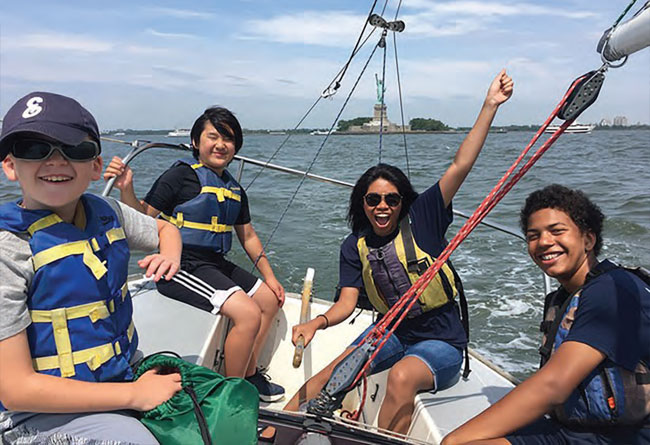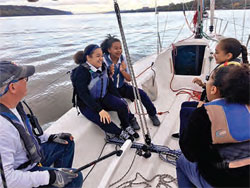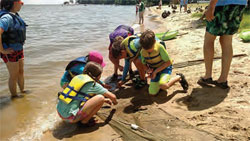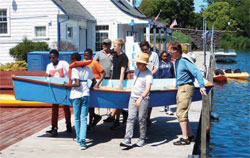
In addition to their many high profile sponsorships, 11th Hour Racing is working quietly away giving opportunities to thousands of youngsters who would otherwise never experience the sea
Sailing has a remarkable power to change lives. As most sailors know, it’s one of the most effective ways to learn essential life skills such as, leadership, teamwork and selfreliance while building confidence, reducing anxiety and discovering a new sense of purpose. Children in particular learn a lot through sailing.
Sailing also provides an intuitive, practical context for key concepts of science, technology, engineering and maths (STEM) – without a good grasp of vectors, for example, you won’t get to the windward mark. It’s especially empowering for kids growing up in difficult circumstances, as it offers a fresh start on a level playing field – or at least one that’s equally choppy for people from all walks of life.
Of the hundreds of grants that 11th Hour Racing has awarded, 37 grants totalling $1.5m directly support a wide range of non-profit organisations that are working to reconnect people with their local waterways, giving more than 17,000 underserved kids an opportunity to get afloat. Many of the low-income communities located near the waterfront still lack access to onwater activities. By providing access and opportunities on the water, urgent issues such as water pollution and the importance of biodiversity and ocean health come to life on a personal and local level.
11th Hour Racing grantees also use boatbuilding to inspire people and foster positive change in their lives. You can’t build a car or even a bicycle without advanced technical skills and a lot of equipment, but with a bit of guidance anyone can easily and cheaply build a boat that floats. And nothing beats the empowerment you get from successfully launching a boat you’ve built with your own hands and sailing or rowing somewhere in it.
These benefits might seem obvious to those who grew up with a tiller in one hand and a mainsheet in the other, but trying to explain that to the people who are responsible for guiding these children but have no experience of sailing themselves is a challenge worth pursuing. The people who lead these community sailing and boating groups are remarkable, and so are the results.
‘Recruiting is often the hardest part, convincing schools and parents that we have something valuable to offer,’ says Patrick McBriarty, a volunteer member of the organising committee of Chicago Maritime Arts Center (CMAC), an 11th Hour Racing grantee. Established in 2017, CMAC offers in-school, after-school and summer camp boatbuilding in some of the toughest neighbourhoods on the south side of Chicago, providing a lifeline for at-risk students. ‘We were lucky to partner with the youth baseball organisation Lost Boyz, who were already doing great work with schools in the community,’ he says. ‘There is a nominal charge for our courses but nearly all of our kids are on scholarships. We have yet to refuse a request.’
Teams of six to eight kids build a Bevin’s Skiff – a dinghy designed specifically for youth boatbuilding classes. ‘One of the ways we teach STEM is by showing the kids how to calculate buoyancy, displacement and stability using models in a test tank,’ McBriarty says. ‘We also teach vocational skills like carpentry, plus teamwork and interpersonal skills.’ Ecology is also part of the curriculum.
Skills aside, CMAC also boosts its students’ self-esteem. ‘When they’re put in charge of their own boat on that last Saturday morning and are figuring out how to navigate, it’s often the first time anyone has ever trusted them and given them responsibility,’ McBriarty adds. ‘Half of our kids have never been in the water, let alone rowed. Our programmes have a big impact on their lives because they don’t have the same opportunities as others.’
A very successful and growing public-access sailing school is Hudson River Community Sailing (HRCS) based in New York City, despite the inherent challenges of its location. Tides on the lower Hudson are fierce, the wind is gusty and fluky, the water is assumed (wrongly these days) to be dangerously polluted and there is a daunting amount of shipping traffic to avoid, including a myriad of ferries plying between Manhattan and New Jersey.
Twelve years after establishing a small community boathouse on a pier in Chelsea with a shoestring budget and some donated J/24s, HRCS now runs nine public access programmes teaching STEM through sailing, boatbuilding and navigation. It offers a four-year curriculum to high school students from nine local schools and all five boroughs of the city, teaching practical sailing from April to November and building Optimist dinghies in the winter months. It also runs summer camps, provides affordable sailing for 3,000 to 4,000 adults every year and offers sailing therapy for U.S. Armed Forces veterans. A recent grant from 11th Hour Racing has helped HRCS open its second Sail Academy in the northern Manhattan neighbourhood of Inwood, where an estimated 25 per cent of residents live in poverty.
‘We know that sailing changes lives and it’s helping us to build a more diverse community,’ says HRCS development and communications director Maeve Gately. ‘It was a big decision for us to open in Inwood. We decided we needed to serve the community with the highest needs. When they first come to us, most of the kids can’t swim and have never been on the water. Many of them aren’t even aware that they live on an island.’
HRCS is unique for providing all of its sail training – even for complete novices – in high-performance J/80s. ‘We just spend a bit more time helping them to get comfortable,’ Gately says. ‘It’s remarkable how quickly they pick up the concepts and I’m always impressed at how well teenagers respond when you give them responsibility.’ Marine ecology is also part of the programme, with students monitoring water quality. HRCS is starting to see long-term benefits from its outreach programmes. ‘In 2018 our first round of students graduated from college,’ Gately says. ‘Half of them majored in STEM subjects. One girl graduated from Massachusetts Institute of Technology (MIT) with a degree in marine engineering. Others have gone on to maritime academies or into marine trades, and one is working on tall ships.’

Above: Hudson River Community Sailing teaching beginners to sail in one of its fleet of J/80s.
Below: students connect with nature, learn to sail on the Chesapeake Bay, and meet new friends they otherwise would not have known.

At the north end of Chesapeake Bay another sailing centre supported by 11th Hour Racing has a new and challenging mission: create a stressfree environment for students to learn about and explore the waterfront. ‘Most of it has happened in the last two years,’ says Baltimore County Sailing Center’s (BCSC) executive director Rob Deane. ‘We’ve been pushing hard to create programmes for people who wouldn’t normally have any sort of access to the water. That’s what sailing should be all about.’ Alongside many other programmes, BCSC runs sailing, kayaking and fishing courses for children from homeless shelters. ‘These kids sleep 50 to a room and they’re growing up in really tough circumstances,’ Deane says. ‘When I saw the extreme need of the families living there, I knew that no matter how challenging, I just had to do this.’
‘At first the kids were terrified and we soon realised they didn’t actually know each other, even though they lived in the same place,’ Deane says. ‘Within 30 minutes they were beginning to interact, playing and enjoying it. Very few people even know the names of some of these kids. When they come to us it’s often the first time they’ve ever felt anyone trust them with anything. And it’s incredible how proud they are of what they’ve learned.’
The Youth Launch Programme is growing rapidly, from 70 kids in total to groups of 30 children per day in 2019. BCSC also runs courses for inner city youth, and some of those kids now work for the organisation. ‘We want to work with more shelters but it is a challenge,’ Deane explains. ‘Because the concept of what we do is completely foreign to them.’

BCSC has also discovered that sailing is a transformative tool to challenge addiction. BCSC includes rehabilitation from drug addiction in its curricula by fostering personal connections to nature. ‘The aim is to help people build inner strength and confidence,’ he says. ‘We’ve had a lot of unexpected successes. Folks struggling with addiction often feel confined and isolated; we take them outside and show them there is an alternative. On weekends, they come here with their children. It’s wonderful to see people reconnecting as a family.’
11th Hour Racing’s grant programme director Michelle Carnevale estimates that in total, the grants she oversees have helped enrich about 700,000 people’s lives. ‘Breaking down barriers and increasing access to hands-on education and local waterways regardless of economic backgrounds is essential to improving ocean health,’ she says. ‘Getting out on the water connects us to ourselves, to each other and to the world around us, reminding us that we are part of a much bigger story. Building these connections increases people’s quality of life, well-being, and ensures the next generation are strong stewards for the ocean.’
Click here for more information on 11th Hour Racing »
We invite you to read on and find out for yourself why Seahorse is the most highly-rated source in the world for anyone who is serious about their racing.
To read on simply SIGN up NOW
Take advantage of our very best subscription offer or order a single copy of this issue of Seahorse.
Online at:
www.seahorse.co.uk/shop and use the code TECH20
Or for iPad simply download the Seahorse App at the iTunes store


